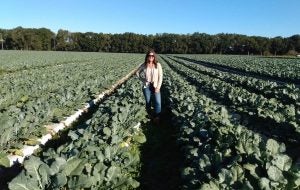Greetings from Garrett Brothers Farm, a 650-acre operation in north central Florida. I’m standing in a 15-acre organic broccoli patch, and these farmers have a great reputation for beautifully healthy produce.

Their agronomist, Cody, is a friend of mine and gave me a tour. If you’re not familiar with the term “agronomist,” it’s basically a doctor for plants. If a farmer has problems, they call an agronomist to help solve the problem and write a “prescription” to keep plants healthy.
Produce generally looks beautiful in the grocery aisle, right? That’s because professional farmers take care of their crop so it’s not disfigured by worms, disease, etc. Florida is hot and humid, with high pest pressure because there are no harsh winters or frost to kill things off. Sun scald, blight, nematodes, worms, and more can be catastrophic and abruptly turn a farmer’s yield to zero if her or she doesn’t quickly take care of the problem.
We as humans need nutrients and chemicals to survive, like bug spray, sunscreen, and food — plants are living and need that, too!
In this organic broccoli field, herbicide is used once in the beginning of the growing season for a clean canvas to transplant the crop into the soil. It’s sprayed with insecticide three or four times and fungicide weekly (yes, even in organic). There are pre harvest intervals before anything can be picked if it was sprayed, and the safest chemicals are the ones used toward the end of the growing season.
Sometimes people are led to believe that synthetic chemistry in agriculture is a bad thing. But from a scientific perspective, this couldn’t be further from the truth! The whole reason synthetic pesticides were created is to provide farmers with safer alternatives than they had in decades prior.
Modern pesticides go through about 15 years’ worth and hundreds of millions of dollars in testing through some of the world’s most reputable food safety authorities, and they carry labels like caution … warning … skull and crossbones, etc. Nowadays, agrochemical companies won’t even entertain a new chemistry if there is even the slightest chance it could be harmful to human health. Crops are always tested for safety and residues. If a farmer violates these regulations, they can lose their right to farm! It’s a very big deal.
Back to organic pesticides. They’re older. More “natural” and non-synthetic. They are often not subjected to the rigorous testing scrutiny that synthetics are, and, depending on the situation, organic pesticides are applied in higher doses. Cody noted that copper is the most popular pesticide used by organic farmers and that pyrethrum is also used here, which is made from chrysanthemums.
I don’t say this to scare you. And no, this post is not sponsored by a chemical company. I only post about stuff like this because I genuinely find it interesting and think it’s wrong for consumers to be lied to or mislead. If you want the TRUTH behind your food, you always need to go to the source. They’re less influenced by marketing tactics.
It’s important to note the safety of the American food supply. When having discussions with the farmers, agronomists, workers … we all agree that we feel 100 percent confident eating produce straight out of the field regardless of whether it’s conventional or organic. Yes, you should always wash your produce for good measure though!
Regardless of what you choose, know that fruits and veggies are a very healthy choice and will always be a better option than processed junk food. But if you’re buying organic in the grocery store and believe it’s better or “chemical free” … this is most likely not the case. ?
Michelle Miller, the Farm Babe, is a farmer, public speaker and writer who has worked for years with row crops, beef cattle, and sheep. She believes education is key in bridging the gap between farmers and consumers.



